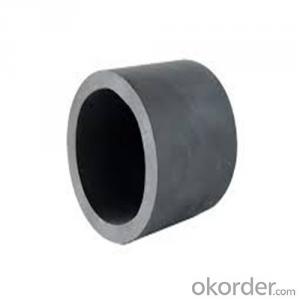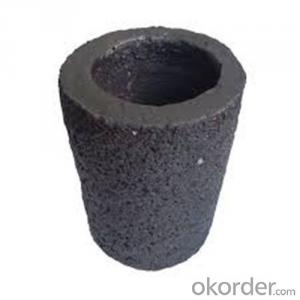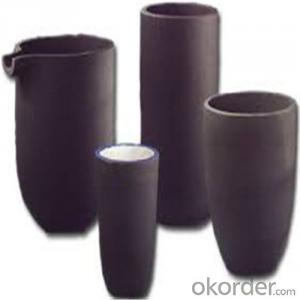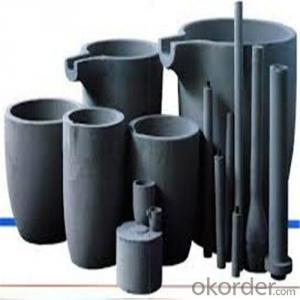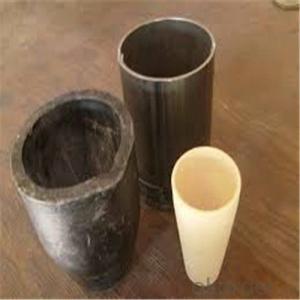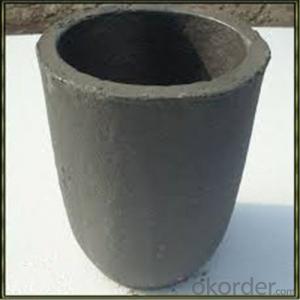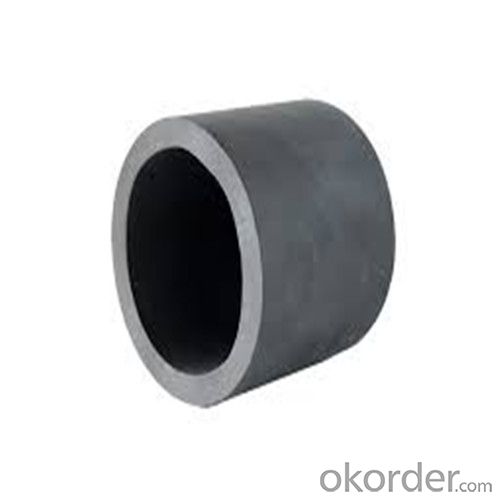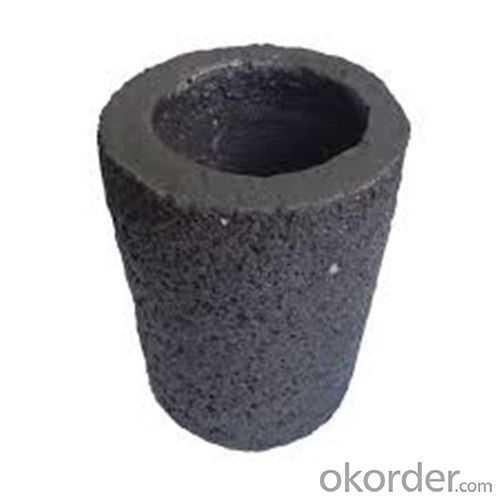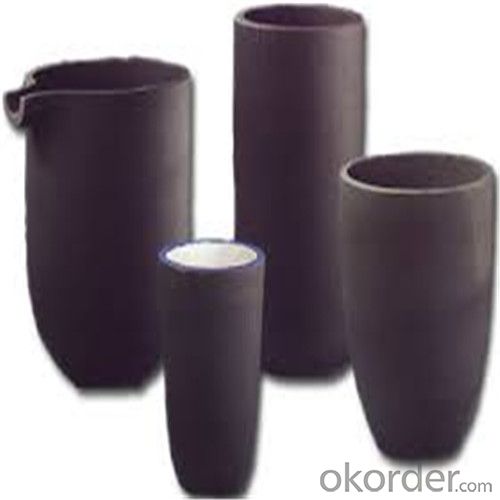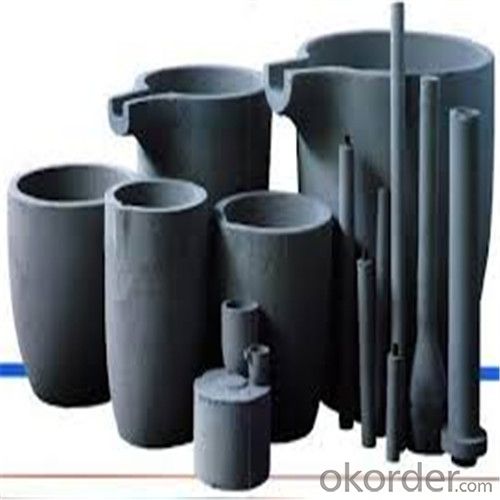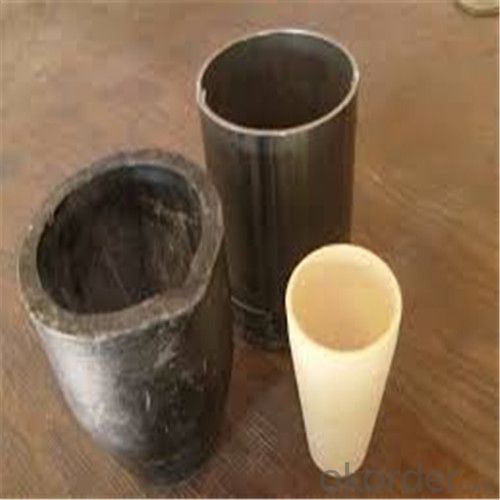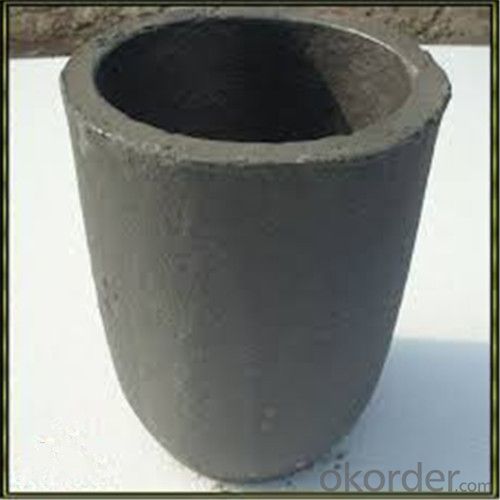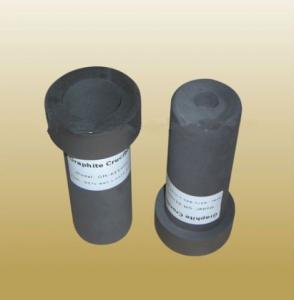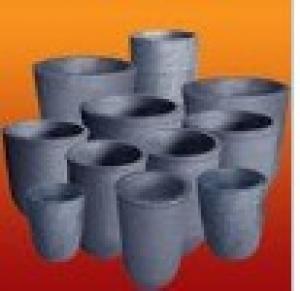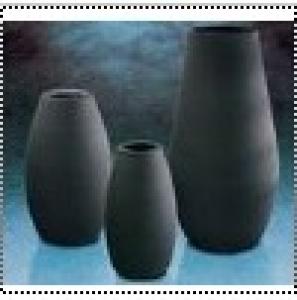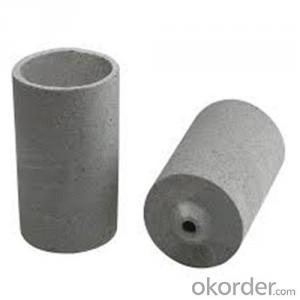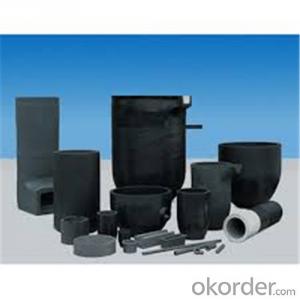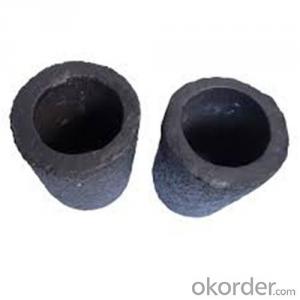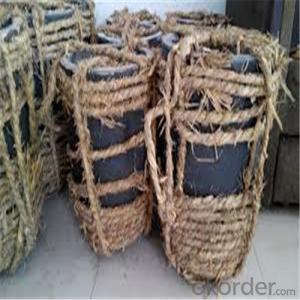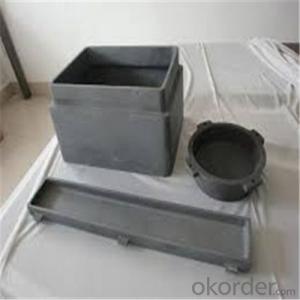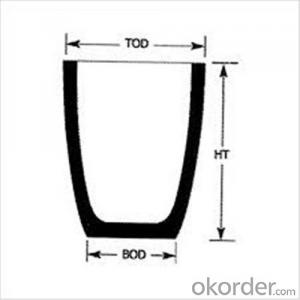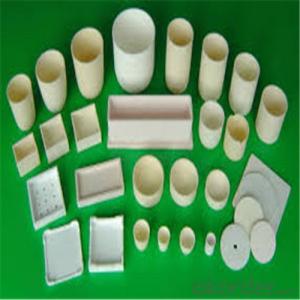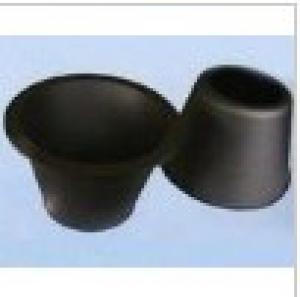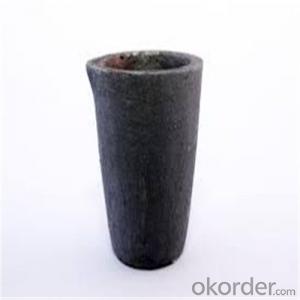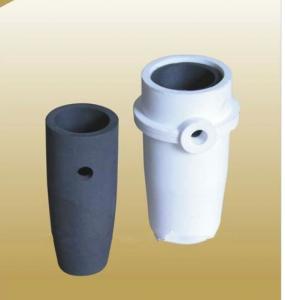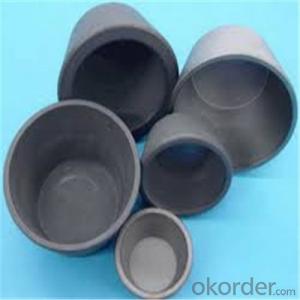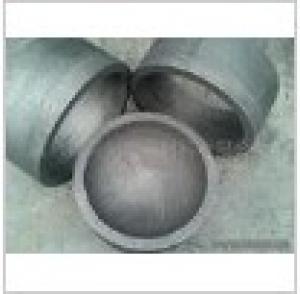Best Crucible Graphite - SIC Crucibles with High Heat Resistance
- Loading Port:
- Shanghai
- Payment Terms:
- TT OR LC
- Min Order Qty:
- 1 pc
- Supply Capability:
- 1000 pc/month
OKorder Service Pledge
OKorder Financial Service
You Might Also Like
Quick Details for SiC Crucibles,SIC Graphite Crucible, Graphite Crucible with Hihg Heat Resistance 2015
| Type: | High Strength, graphite crucible crucible | Application: | melting metal | Height: | as your requirements |
| Composition: | High Pure | Top Diameter: | 10-600mm | Bottom Diameter: | 10-1000mm |
| Place of Origin: | China (Mainland) | Brand Name: | Model Number: | ||
| Color: | Black grey | Si3N4%: | 5min | Fe2O3%: | 0.7max |
| C%: | 30-45 | Apparent porosity: | 30max | Refractoriness: | 1680 |
| Bulk Density: | 1.71min | Using life: | >5000 hours | MAX temperature: | 1600c |
Packaging & Delivery
| Packaging Details: | Seaworty packing or as per customer's detail requirement of graphite crucible. |
| Delivery Detail: | within 20-30 days after confirm order of graphite cru |
SiC Graphite Crucibles For Melting Aluminium And Copper, Brass
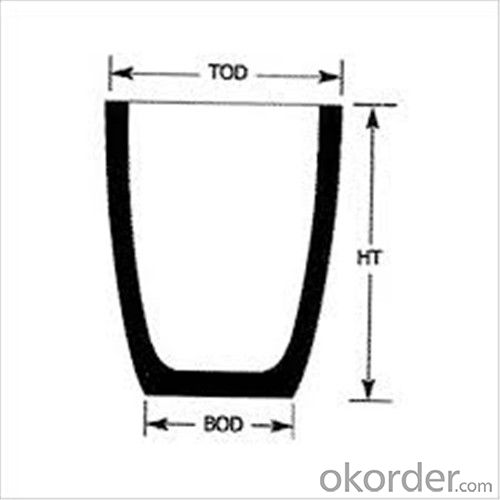
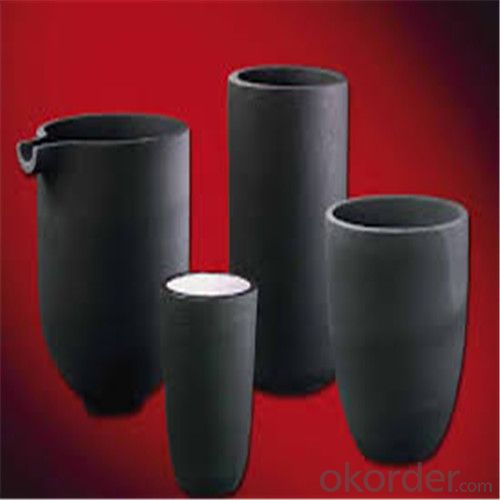
Physicochemical Properties of graphite crucible:
Features of SiC 95% silicon carbide sic crucible
1. resistance to deformation at high temperature,
2. thermal shock resistance, wear resistance, corrosion resistance.
3. anti-oxidation, anti- erosion.
Usage of SiC 95% silicon carbide sic crucible
electricity and steel slag trench,
coal chemical and mining transport pipeline.
high pure graphite | ||||
Item | Unit | baked twice | baked three time | baked four times |
impregnated once | impregnated twice | impregnated three times | ||
grain size | mm | ≤325μm | ≤325μm | ≤325μm |
Bulk density | g/cm3 | ≥1.68 | ≥1.78 | ≥1.85 |
Specific resistance | μΩ.m | ≤14 | ≤14 | ≤13 |
Bending strength | MPa | ≥25 | ≥40 | ≥45 |
Compressive strength | MPa | ≥50 | ≥60 | ≥65 |
Ash content | % | ≤0.15 | ≤0.1 | ≤0.05 |
Fine-grain Specialty Graphite FXG-1 | Fine-grain Specialty Graphite FXG-2 | ||||
Item | Unit | Guarantee value | Typical value | Guarantee value | Typical value |
Max grain size | mm | 0.8 | 0.8 | 0.8 | 0.8 |
Bulk density | g/cm3 | ≥1.70 | 1.73 | ≥1.73 | 1.76 |
Specific resistance | μΩ.m | ≤8.5 | 7.5 | ≤8.0 | 7 |
Bending strength | MPa | ≥10.0 | 11 | ≥12.0 | 12.5 |
Compressive strength | MPa | ≥24.0 | 27 | ≥31.0 | 34 |
Thermal Condcutivity | W/(m.k) | ≥120 | 150 | ≥130 | 160 |
C.T.E.(100-600) °C | 10-6/°C | ≤2.5 | 2.2 | ≤2.5 | 2.1 |
Ash content | % | ≤0.3 | 0.09 | ≤0.3 | 0.09 |
FAQ
1.What's your MOQ?
We will indicate the MOQ for each item in the quotation list. We accept the sample and trail order.
2.Can I negotiate the Prices?
Sure, we may consider discounts for bulk order of products.
3.How long will it take to complete my order?
For the stock items, we can arrange the shippment within 2~3days after received your payment. For the customized items, we will indicate the delivery time in the quotation list.
4.Can you give warranty of your products?
Yes, we extend a 100% satifisfaction guarantee on all items. Please feel free to provide timely feedback if you're not satisfied with N&D's Quality and Service. For the overseas orders, if there is a quality problem, please kindly to provide the picturers to show the problem by e-mail. We will provide the replacements to you at our cost according to actual conditions.
5.Can I visit you?
Sure. If you're a volume buyer and would like to visit our in-house products and production line, please contact us to make an appointment.
- Q: Can graphite crucibles be used for melting and casting of non-ferrous metals?
- Graphite crucibles are capable of being utilized in the process of melting and casting non-ferrous metals. Within various industries, including foundries and metalworking, graphite crucibles are highly prevalent due to their exceptional thermal conductivity and ability to withstand high temperatures. Non-ferrous metals, such as aluminum, copper, zinc, and gold, possess lower melting points when compared to iron and steel, thus rendering them appropriate for melting within graphite crucibles. The superior thermal conductivity of graphite ensures the even distribution of heat throughout the crucible, thereby facilitating the efficient melting and casting of non-ferrous metals. Furthermore, graphite crucibles exhibit commendable chemical resistance and minimal reactivity with non-ferrous metals, thereby further enhancing their suitability for this particular application. Nevertheless, it is crucial to acknowledge that graphite crucibles may not be suitable for certain metals that are reactive or corrosive, as they have the potential to react with graphite and adversely impact the quality of the casting.
- Q: What are the different methods of measuring the temperature inside a graphite crucible?
- There are several methods that can be used to measure the temperature inside a graphite crucible. 1. Thermocouples: Thermocouples are widely used for temperature measurement in various industrial applications, including inside graphite crucibles. These devices consist of two different metal wires joined together to form a junction. When there is a temperature difference between the junction and the other end of the wires, a voltage is generated, which can be measured to determine the temperature. Thermocouples are relatively simple, cost-effective, and provide accurate temperature readings. 2. Infrared (IR) Pyrometers: Infrared pyrometers use the principle of thermal radiation to measure the temperature of an object without making direct contact. These devices detect the infrared radiation emitted by the graphite crucible, which is directly proportional to its temperature. IR pyrometers are non-contact and can provide quick temperature readings, making them suitable for applications where direct contact is not possible or desirable. 3. Optical Pyrometers: Optical pyrometers utilize the principle of color temperature to measure the temperature of an object. These devices work by comparing the color of the object being measured to a calibrated scale. By adjusting the scale until the colors match, the temperature can be determined. Optical pyrometers are commonly used in high-temperature applications and can provide accurate temperature readings. 4. Radiation Thermometers: Radiation thermometers, also known as non-contact infrared thermometers or infrared thermometers, measure the temperature by detecting the thermal radiation emitted by the graphite crucible. These devices typically use a detector to convert the thermal radiation into an electrical signal, which is then processed to determine the temperature. Radiation thermometers are non-contact, fast, and can provide accurate temperature measurements. 5. Contact Probes: Contact probes, such as thermocouple probes or resistance temperature detectors (RTDs), can be inserted directly into the graphite crucible to measure its temperature. These probes are typically made of high-temperature resistant materials and are connected to a temperature indicator or controller. Contact probes provide direct temperature readings and are commonly used in applications where continuous monitoring and control of temperature are required. Each of these methods has its advantages and limitations, and the choice of measurement technique depends on factors such as temperature range, accuracy requirements, response time, and the specific characteristics of the graphite crucible and its contents.
- Q: Can graphite crucibles be used for jewelry making?
- Yes, graphite crucibles can be used for jewelry making. Graphite crucibles are known for their high melting point, making them ideal for melting and casting precious metals such as gold, silver, and platinum. They are also highly resistant to thermal shock and have good thermal conductivity, allowing for efficient and uniform heat distribution. Additionally, graphite crucibles are chemically inert, meaning they do not react with the molten metals and therefore do not contaminate the jewelry being made. This makes them a popular choice for jewelers and craftsmen who require a reliable and durable crucible for their jewelry making processes.
- Q: Is pig iron smelted in a graphite crucible?
- No, is cast iron and cast iron crucible for melting, Aluminum Alloy, zinc alloy, lead alloy, tin antimony alloy, alloy and other metal appliances, more durable than iron crucible.
- Q: What are the advantages of a graphite furnace atomizer compared to a flame atomizer?
- Graphite furnace atomic device is a type of system will be placed in the pipe wall, graphite platform, carbon sample holes or graphite crucible with electric heating to a high temperature to achieve atomization. Tubular graphite furnace is the most commonly used atomization device.
- Q: Are carbon and graphite widely used? What fields are they applied to?
- Isostatic graphite is manufacturing single crystal furnace, continuous casting mould, metal graphite EDM with graphite telegraph irreplaceable materials, is making a rocket nozzle, graphite reactor deceleration materials and reflecting materials excellent material.
- Q: Can a graphite crucible be used for tin melting?
- Indeed, tin melting can be accomplished using a graphite crucible. In numerous high-temperature scenarios, such as metal melting, graphite crucibles find extensive utilization. Due to its exceptional heat resistance and elevated melting point, graphite is well-suited for both containment and endurance of the extreme temperatures required for tin melting. Furthermore, graphite exhibits commendable thermal conductivity, facilitating the attainment of uniform heat distribution throughout the melting procedure. Consequently, when it comes to melting tin, a graphite crucible proves to be a fitting selection and is widely employed in foundries and metallurgical industries for this very purpose.
- Q: What crucible can be used to make steel? At least 1500 degrees resistant
- BOF is carried out in the converter. The converter is shaped like a pear, wall brick, oven side holes (outlet), compressed air from these holes blowing furnace, also called side-blown converter. Initially, the converter at the level of 1300 degrees Celsius, inward injected liquid raw lime and iron. Adding a certain amount of air, and then make it stand upright and rotate the converter.
- Q: What are the characteristics of jade? There are jade and jade on the market. How do you distinguish it from jade?
- Artificial jade, like artificial diamond, is a kind of natural gem product made by artificial simulation of natural gem. It has certain characteristics of natural gem. Emerald is based on the super bedrock rock are widely distributed, actinolite glaucophane schist and chlorite schist, high temperature and ultra high pressure on the geological environment in the formation of the process of imitation jade.
- Q: What is the porcelain crucible with a small hole under it?
- The main material of the graphite crucible is crystalline natural graphite. Therefore, it keeps all kinds of physical and chemical characteristics of natural right ink. That is: good thermal conductivity and high temperature resistance, in the process of high temperature use, the coefficient of thermal expansion is small, and has a certain strain resistance to hot and cold. The corrosion resistance of acid and alkaline solution is strong, and it has good chemical stability.
Send your message to us
Best Crucible Graphite - SIC Crucibles with High Heat Resistance
- Loading Port:
- Shanghai
- Payment Terms:
- TT OR LC
- Min Order Qty:
- 1 pc
- Supply Capability:
- 1000 pc/month
OKorder Service Pledge
OKorder Financial Service
Similar products
Hot products
Hot Searches
Related keywords
